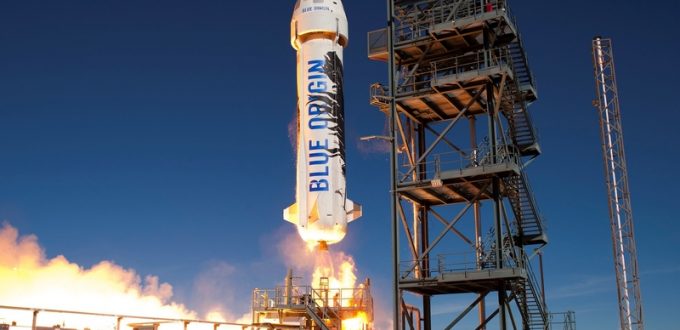
by James Holbrooks at UR
Rancho Palos Verdes, CA — Last week, at the recently concluded Code Conference, Amazon CEO Jeff Bezos talked about his thoughts on the current state of space travel, the role he sees for himself in that endeavor, and the things he predicts will happen in the coming decades — such as an Earth without heavy industry.
“I think you go to space to save Earth,” Bezos told Walt Mossberg, co-founder of tech news site Recode, in front of the invite-only crowd in California. “We know about the solar system now. We’ve sent robotic probes all over the solar system. Let me assure you, this is the best planet.”
Bezos, who says he’s been interested in space since he was a little boy, created a private spaceflight company, Blue Origin, in 2000. Since that time, the company’s signature rocket, New Shepard, has been successfully launched — and safely landed — three times.
The steady benchmarks being set by Blue Origin have just been acknowledged via partnership with NASA. Bezos’ company was recently contracted to test payload launches into suborbital space with the New Shepard rocket.
But the CEO has great concerns about America’s national space program.
“If you look at the dynamism in the space industry, it’s very slow,” Bezos said at Code Conference. “Very little has happened. It’s been in stasis for fifty years, by and large.”
Rather than jump start that endeavor, however, Bezos says his skills and resources can be of much better use in a different capacity. From his talk:
“If you go back to when I started Amazon, all of the heavy lifting infrastructure to support Amazon was already in place. We did not have to invent a remote payment system. It was already there. It was called the credit card … We did not have to invent transportation … There was this thing called U.S. Postal Service and UPS.”
So Bezos believes his biggest contribution to space travel should be the industrial infrastructure he puts into place for the next wave to utilize.
“I’m using my resources to put in place heavy lifting infrastructure so that the next generation of people can have a dynamic, entrepreneurial, explosion into space. And I think that’s possible. And I believe I know what you need to do to put that infrastructure in place.”
Bezos seems to envision a future where Earth is for working and playing, and the eyesore — and environmental headaches — of industry has been shipped to the stars.
“All of our heavy industry will be moved off-planet,” he said at Code Conference. “And Earth will be zoned Residential and Light Industrial. And that just makes a lot of sense. You shouldn’t be doing heavy industry on Earth. Resources are more plentiful in space.”
In fact, according to the Amazon boss, there won’t even be factories making computing components on Earth in the future.
“We can build gigantic chip factories in space and then send the little bits down,” said Bezos. “We don’t actually have to build them here.”
When people talk about Bezos and his private spaceflight program, another name often comes up — that of fellow billionaire, Elon Musk. Like Bezos, Musk created his own spaceflight company, SpaceX, back in 2002.
“I know Elon and we’re very like-minded in many ways,” said Bezos when Mossberg asked about the Tesla CEO. “We’re not conceptual twins … One of the things I want us to do is go to Mars. But for me, it’s one of the things. He’s singularly focused on that.”
For Bezos, it seems Mars is on the afterburner. For the time being, he’d rather do what he can he help the planet he’s on — and pave the way for the next generation to do the same.
“For me, I don’t find that Plan B idea motivating … I don’t want a Plan B for Earth. I want Plan B to be to make sure Plan A works.”
This article (Amazon CEO Bezos Has a Plan to Save the Planet, and It’s Crazy Enough to Work) is free and open source. You have permission to republish this article under a Creative Commons license with attribution to James Holbrooksand UndergroundReporter.org. If you spot a typo, please email the error and the name of the article to [email protected]. Image credit: YouTube





time travel relativity… imagine remote viewing 2days in the planet you have to persee one unit at a time in countersunrise direction and you will be in the future.